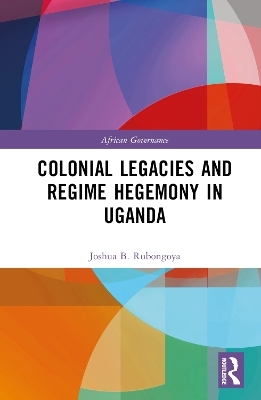
Colonial Legacies and Regime Hegemony in Uganda
Seiten
2025
Routledge (Verlag)
978-0-367-69415-9 (ISBN)
Routledge (Verlag)
978-0-367-69415-9 (ISBN)
- Noch nicht erschienen (ca. März 2025)
- Versandkostenfrei
- Auch auf Rechnung
- Artikel merken
This book explains the prevalence of electoral authoritarianism (or multi-party autocracy) in Ugandan politics, examining why repeated elections have not deepened democracy. Shedding light on how to deconstruct movement politics and consolidate democracy in Africa, this book will interest scholars of African politics and democratization.
This book explains the prevalence of electoral authoritarianism (or multi-party autocracy) in the politics of sub-Saharan Africa and examines why repeated elections have not deepened democracy.
Using Uganda as a case study, the book examines the hegemonic regimes that underpin electoral authoritarian regimes in the context of a colonial legacy. Employing a historical institutionalist approach, the author considers independence struggles as formative moments and the nationalist period as a critical juncture in Uganda’s historical experience. The analysis posits that the structure and dynamic of political organization/participation adopted in the run up to independence and the responses by the colonial state laid the ground for “movement politics” and a path toward post-colonial autocratic rule.
Shedding light on how to deconstruct movement politics and consolidate democracy in Africa, this book will be of interest to scholars of African politics and democratization.
This book explains the prevalence of electoral authoritarianism (or multi-party autocracy) in the politics of sub-Saharan Africa and examines why repeated elections have not deepened democracy.
Using Uganda as a case study, the book examines the hegemonic regimes that underpin electoral authoritarian regimes in the context of a colonial legacy. Employing a historical institutionalist approach, the author considers independence struggles as formative moments and the nationalist period as a critical juncture in Uganda’s historical experience. The analysis posits that the structure and dynamic of political organization/participation adopted in the run up to independence and the responses by the colonial state laid the ground for “movement politics” and a path toward post-colonial autocratic rule.
Shedding light on how to deconstruct movement politics and consolidate democracy in Africa, this book will be of interest to scholars of African politics and democratization.
Joshua B. Rubongoya is Professor Emeritus at Roanoke College, Virginia, USA. He holds the Ph.D., from the Josef Korbel School of International Studies, University of Denver where he studied as a Fulbright Scholar. The author of “Regime Hegemony in Museveni’s Uganda: Pax Musevenica”, Dr. Rubongoya has authored numerous articles, book chapters and reviews. He has also consulted for the World Bank and is currently a V-Dem expert for Uganda.
1: Movement Politics as Hegemony Project 2: The Colonial Legacy in Historical Perspective 3: Maturation of Movement Politics as Colonial Legacy in the Post-Colony 4: Electoral Multi-party Autocracy and Contemporary Legacy Politics (2006-2021) 5: Conclusion
| Erscheint lt. Verlag | 26.3.2025 |
|---|---|
| Reihe/Serie | African Governance |
| Zusatzinfo | 6 Tables, black and white; 1 Line drawings, black and white; 1 Illustrations, black and white |
| Verlagsort | London |
| Sprache | englisch |
| Maße | 156 x 234 mm |
| Themenwelt | Sozialwissenschaften ► Politik / Verwaltung ► Politische Systeme |
| Sozialwissenschaften ► Politik / Verwaltung ► Vergleichende Politikwissenschaften | |
| Sozialwissenschaften ► Soziologie ► Spezielle Soziologien | |
| ISBN-10 | 0-367-69415-8 / 0367694158 |
| ISBN-13 | 978-0-367-69415-9 / 9780367694159 |
| Zustand | Neuware |
| Haben Sie eine Frage zum Produkt? |
Mehr entdecken
aus dem Bereich
aus dem Bereich
über Alltagsorte des sozialen Zusammenhalts
Buch | Softcover (2024)
transcript (Verlag)
CHF 33,55


